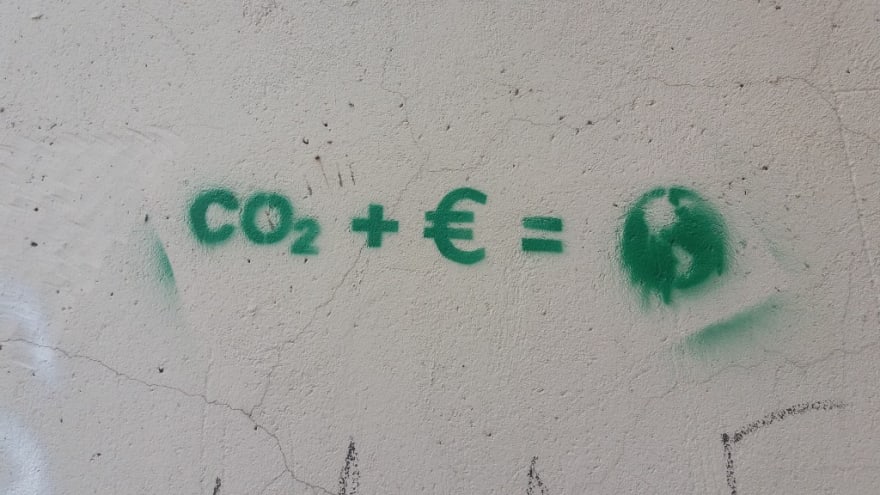
"The end is in the beginning and yet you go on." — Samuel Beckett
Almost exactly one year ago I found myself sitting in a meeting room together with four gentlemen. I was interviewing for a scientific programmer job at a small software consultancy, at that time located somewhere outside Oslo. It was a pleasant sort of affair, though at one specific point during the discussion, the atmosphere in the room took an expected turn.
"He’s one of those environmentalists" — the CEO was probably thinking, by the curious expression on his face and slight change of tone in his speech. His attitude appeared to become more defensive and he also seemed surprised that I’d be preoccupied with matters concerning the climate. After all, this is a sought-after software engineer position where one would be working with several cloud technologies, in a team of geo-physicists and data scientists. And the company was also a spin-off of a reputable software research institute in Norway.
The advertisement said the company is developing solutions for the energy sector. I don’t know exactly why, but I assumed “renewable” energy. But the story that was presented to me during the interview was slightly different from what I imagined. I’ve been presented with a sophisticated desktop application which was used in the development of seismic modelling of the ocean floor, for the purpose of discovering and exploration of oil reserves. One of the main customers was the biggest Norwegian producer of oil & gas, Equinor.
“But the world is transitioning to renewable energy sources,’’ I said after they finished the presentation, with what must have been an unexpected interruption. And even if the atmosphere has started to become considerably awkward, I kept on and, addressing the whole group, I asked if they had seen the latest IPCC report on global warming. At that time, the CEO didn’t seem familiar with the report, but one of the scientists was and mentioned something to him. Eventually the CEO made a remark saying that of course they agreed with the need to transition to renewable energy sources but that needs to be addressed from an economic point of view as well. The rest of the group didn’t seem to disagree with the narrative.
Equinor has published last year a press release celebrating Norway’s third largest oil field beginning production, and branding it “a technological triumph and a milestone for the Norwegian oil industry”.
They also seem to acknowledge the severity of the climate crisis and the importance of cutting down on emissions. “It’s 2019 and climate strikes are taking place the world over. So why are we so proud of our new oil field?”, says on the promotional page of their newly opened oil field.
Why indeed. Equinor is no doubt trying to have their cake and eat it, as they say in Britain. They are reassuring shareholders and doing everything in their capacity to appear supportive of the Paris accord, while still producing more oil.
The Age of Perpetual Crisis
“I can feel the discomfort in your seat”, the lyrics of a popular song goes. 2019 was a year when the climate crisis has reached the forefront of the public imagination, and any stories about it now carry a significantly higher degree of discomfort. Headlines are telling us, in a rather alarmed tone, that we are living in the age of perpetual crisis — environmental, social, political. “It’s a Jungle out there”, as another popular tune would say.
I’ve considered writing something on climate from a practical point of view, to examine how the tech industry might be able to contribute with direct solutions. Such an article would probably have been something like a call to action — let’s get enough people interested, raise awareness of the environmental crisis, and then start working on cleantech solutions. If we can deploy some capital on green start-up accelerators, maybe we can make a significant contribution to solving the biggest crisis that humanity is facing at the moment. And hopefully someone will turn off the oil pipes.
I did try to write such a piece. I started collecting stories related to climate and the environment from the tech industry. Noticeably, there aren’t so many such stories. In the tech industry, the collective preoccupation with climate change or the environment is still severely limited. Anything that has to do with the climate or the natural world appears merely as an after-thought, and gets dismissed almost instantly as something which happens somewhere else.
As my research was expanding, my discomfort was mounting. My original idea to write a piece on climate from a software developer point of view looked increasingly like a superfluous and banal enterprise. I’ve come to the conclusion that initiatives like carbon-neutral data centers have ultimately the effect of a drop in a bucket, compared to what the response to the climate crisis should be. Instead I decided to investigate why is there such an enormous lack of urgency and disconnect between where the tech industry is at the moment and where it should collectively be, and if it is even conceivable for the tech industry to be focused on solutions for the climate crisis?
Speaking of collective action, the open source funding platform OpenCollective recently published an article on their blog in which they have sounded the alarm regarding our current predicament and they have announced their participation in the Global Digital Climate Strike, urging others to do the same. The movement was initiated by the international climate campaign group 350.org. The action consists of temporarily shutting down your website or service, in part or completely, in protest against the lack of policies to tackle the climate crisis. 350.org is also behind the global climate strikes and is backing Greta Thunberg’s Fridays For Future school strikes movement, which have proved the most effective and galvanizing climate movements in recent years, if not decades.
Climate Change Can’t Be Solved With Enthusiasm
Alright, but why is this our problem? We’re in the software development business, and our primary concern is to build and ship software. How is this our responsibility? Insisting on this argument makes the entire tech industry look like the musicians on board of the sinking Titanic ship, playing to the tune of the inevitability of their peril. But the tech industry, being mainly concerned at the moment with things like AI, ML, Blockchain, or crypto currencies, hasn’t even realised the terrifying course we are on as a planet.
Instead, it is perfectly in tune with the neoliberal economic model which demands exponential growth through free-market capitalism, without the slightest concern for the climate and the effects that digital technology has on the environment. Even more so, when it comes to technologies like Blockchain, everyone is in love with its potential to deliver on the libertarian dream of decentralisation and democratization of institutions, with even the UN endorsing it, and for climate action no less.

Still, one tech founder tells me on Twitter that there is “growing concern” in the tech industry, which might suggest there is some hope that maybe climate change and the environment will stop being the annoying buzz-killers in the background.
“Climate change is the new crypto”, another tech investor wrote on Twitter last November, suggesting that many of the “smartest minds in tech” are shifting their enthusiasm to working on solutions for the climate crisis. The appetite for working on climate solutions in the tech industry does appear to be growing at the moment, although no major government seems capable of entertaining the idea that fossil fuels must stay in the ground.
Okay, so isn’t this good news, that there is some preoccupation in the tech industry? Not necessarily, no. For one, almost all efforts in the tech world seems to focus on legitimising its operations, either digital or logistical, by cleaning out its act, for instance with Google’s carbon neutral data centers. In the specific crypto sphere, there are also detailed reports, such as this one, which goes to great lengths to claim that the crypto mining operations use around 85% renewable energy.
Climate change is not an issue to be solved with enthusiasm. You can’t simply fix global warming by launching green start-up accelerators and investing in “disruptive” new technologies to lower emissions, despite what Bill Gates would have you believe. It’s not enough to make our applications greener and our data centers carbon neutral and then carry on with business as usual. Such initiatives not only have little to no actual effect, but they may obscure the reality, potentially giving the impression that things are going well and action is being done. And the harsh reality is that the tech industry still works hand-in-hand with the already heavily subsidised fossil fuel industry in enthusiastically supplying digital technology and infrastructure, such as cloud data platforms.
For execs of big tech companies, taking a strong position in fighting the climate crisis is nothing more than a ridiculous fantasy. To Amazon, for instance, the idea that they should take any meaningful action sounds so obscene that they have to resort to coercive measures against their employees who organize and demand it. Amazon isn’t the only major tech company facing calls for stronger climate action.
Google is also facing mounting pressure, with more than 2,000 employees having signed a pledge supporting climate action and a separate open letter which calls on the tech giant to commit to and release a company-wide climate plan. There is also an industry wide tech workers coalition, albeit only in its infancy, but acknowledging “tech’s dirty role in climate change” and voicing bold demands. In addition, there is a global community ClimateAction.tech where tech professionals can connect with one another on matters concerning climate change.
Responsibility Is Not Predicated By Guilt
Perhaps one aspect can offer the best explanation to why individuals are being reluctant to demand stronger climate action. It is quite uncontroversial to say that people all over the world are responsible for global warming. If only we could have done a bit more recycling, if only we would have changed the petrol engine car to a Tesla, maybe we wouldn’t have ended up in this mess.
“Anyone can make a change”, isn’t this what we’re told? Sure, anyone has the power to turn off the oil pipes. Each of us sits on the board of multinational corporations and can decide how much rainforest is going to be wiped out to grow palm oil so we can enjoy a chocolate spread for breakfast. Don’t we all have millions to spend on financing think-tanks so we can lobby policy makers? Yes, anyone can make a real change.

As I write this, Australia is battered by the most severe wildfires ever witnessed in its history, and take for instance Richard Flanagan’s December column for The Guardian, who’s one of Australia’s most prominent novelists and also an outspoken environmental campaigner. Referring to the climate crisis, he makes the statement that “human beings all over the world are responsible [for causing it]”. This is a fundamental problem in the way in which we talk about the climate crisis. Humans as a species have caused global warming, but you personally did not cause it, even if you read this article on an iPhone.
Nor had I caused global warming, just because I am writing this on a laptop. Individuals aren’t guilty for mass extinction, which is what global warming leads to, but guilt is being scaled down to individuals. We are however, as a species, as a whole, responsible to fix it, but responsibility is not predicated by guilt.
Being Ecological In The Anthropocene
As an individual, you can’t do anything to stop climate change, however you may be prepared to change. We need a radical new attitude to the climate crisis, ecology, and the environment, which should begin with not worrying about our own individual carbon footprint. In the current free-market, global economic system any individual efforts of minimising it are practically worthless.
In addition, our current anthropocentric attitude towards ecology, especially in the tech world, is incompatible with any kind of effective climate action. The theorist Timothy Morton, who’s been dubbed “the philosopher prophet of the Anthropocene” by The Guardian, makes the case that thinking in an ecological way requires that we let go of our current idea of nature. In his last book Being Ecological, Morton, who adheres to a school of philosophical thought known as Object Oriented Ontology (OOO), argues that our pastoral view of nature, our association of it with rolling hills, green meadows, birdsong, and so on, are very problematic and may even prevent us from contemplating any effective action.
According to Timothy Morton, nature isn’t “actual trees and bunny rabbits, it’s a concept, an interpretation”.
Being ecological doesn’t mean that we must become aware of the environment and the natural world, it means that we discard the idea that there is a separation in the first place. There is no separation between an iPhone and a bunny rabbit, or a slug for that matter. Everything is interconnected, and it’s not the bunny rabbits that are causing mass extinction. They can’t turn off the oil pipes by themselves. If you read this and think that it sounds ludicrous, consider that for thousands of years this ecological way of co-existence with the environment, known as kincentric ecology has been common to most indigenous peoples around the world. Something which the modern Eurocentric idea of progress through industrial capitalism has instructed us to dismiss in an instant.
It is for all accounts and purposes unrealistic to expect strong action on climate from big tech companies, who will most likely take any ecological idea and laugh it out as preposterous hippie-dippie nonsense. However tech workers are very far from having explored all avenues that could lead to collective, effective action, especially when you consider the fact that most of the software which powers the world’s digital infrastructure is by now open-source. Climate strikes, along with action by the activist group Extinction Rebellion, have been proven the most effective and galvanising forms of climate action in the past year. Indeed, as Oscar Wilde wrote in 1891, “it is through disobedience that progress has been made, through disobedience and through rebellion.”
Originally published at https://hackernoon.com on January 18, 2020.


Top comments (2)
Good thinking. So conclusion is that changes in personal behavior or consumption patterns have a marginal effect, the only thing that's really effective is exerting pressure for policy changes - publicity, protest and boycott.
Well said! I agree completely. I was first a ecology activist before becoming a software developer.
Like you, I feel that the tech industry is not involved enough, while it is a huge part of the problem. As tech workers, we should think more about this problem.
Meanwhile, even if the public action is necessary, we must propose alternatives.
Because opposition is nothing without proposition.
From thinking about housing data (maybe with smaller human-sized datacenters, powered by renewable energy), to software development (less memory used, less energy necessary to show a website, more efficient techniques,...) we have a huge part to play.